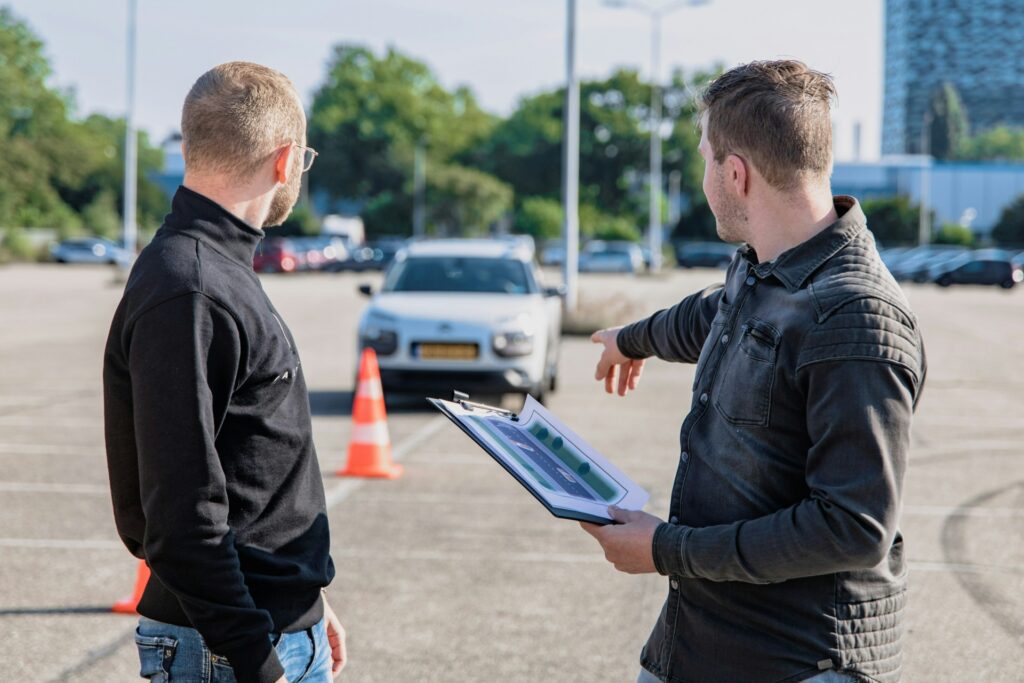1 Start on time
One of the biggest mistakes many candidates make is starting too late. Give yourself at least a few weeks to go through the material and practice thoroughly.
2 Use the right study materials
Not all theory books and online courses are of the same quality. Choosing the right study materials can make a big difference in how well you understand the rules of the road. Here’s what to look for:
- Official study guides: Always use books or online courses that are approved by the official driving authority in your country.
- Interactive learning platforms: Some websites and apps offer interactive quizzes, video explanations, and real-life driving scenarios to enhance your learning experience.
- Updated content: Traffic laws can change, so ensure that the materials you use are up to date with the latest regulations.
- Practice tests from reliable sources: Some free tests online might not be accurate. Choose reputable websites or apps that closely mimic the actual exam format.
Investing in high-quality study materials will save you time and effort, increasing your chances of passing on the first attempt.
3 Take plenty of practice exams
Practice exams not only help you recognize the questions but also get used to the way they are phrased. Try to take as many different practice exams as possible.
4 Understand the rules instead of just memorizing them
Rote learning is less effective than truly understanding why a rule exists. If you only memorize facts, you might struggle when questions are phrased differently. Instead, try to understand the logic behind traffic rules. Ask yourself questions like:
- Why do certain vehicles have the right of way?
- How does speeding affect stopping distance?
- Why are some road signs shaped differently from others?
By understanding these concepts, you’ll be able to apply your knowledge to real-life scenarios and tricky exam questions. A great way to reinforce understanding is by watching videos that explain traffic situations and practicing with interactive scenarios.
5 Learn from your mistakes
When taking practice exams, analyze your mistakes. Write them down and make sure you understand why you got them wrong.
6 Focus on difficult topics
Some topics are notoriously tricky, such as right-of-way situations, braking distance calculations, and road priority rules. These questions often trip up test-takers because they require critical thinking rather than simple memorization. Here’s how to master them:
- Right-of-way scenarios: Use visual aids or apps that simulate different traffic situations.
- Braking distance calculations: Learn the formulas and understand how factors like weather conditions, road surfaces, and tire quality affect stopping distance.
- Priority rules: Study real-life examples and try to apply them in everyday traffic situations when observing drivers on the road.
If a particular topic is confusing, break it down into smaller parts, find explanatory videos, or ask someone with driving experience for clarification.
7 Stay calm and take your time
On exam day, staying calm is key. Read the questions carefully and don’t rush. Often, the correct answer becomes clear when you take your time to think.
8 Know what to expect
Find out in advance how the exam works. How many questions will you get? How much time do you have? Understanding the format reduces anxiety and helps you prepare more effectively. Here’s what you can do:
- Visit an official testing center website to check the structure of the exam.
- Watch video walkthroughs of the exam process to familiarize yourself with the digital interface.
- Practice with a timer to simulate real exam conditions.
Knowing what to expect means fewer surprises on test day, allowing you to focus on answering questions accurately rather than worrying about the process.
9 Study with others
Learning together can be motivating and effective. Explain rules to each other or quiz one another to test your knowledge.
10 Get a good night’s sleep
Avoid studying late into the night before your exam. A well-rested brain functions better and helps you find the right answers more quickly.
So in conclusion…
With proper preparation, the right study materials, and smart practice techniques, you can pass your theory exam on the first try. Start early, practice often, and stay calm on exam day. Good luck!




